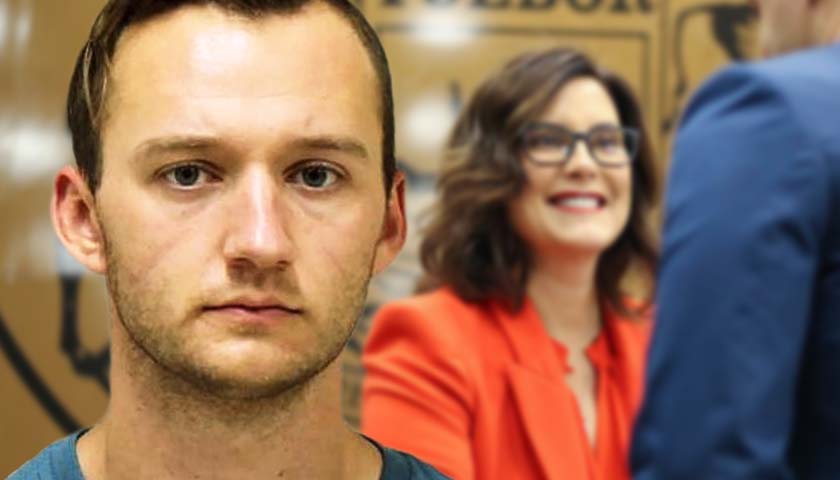by Scott McClallen
A federal plea deal filed Monday says Kaleb Franks, 27, will plead guilty to the March 2020 plot to kidnap Gov. Gretchen Whitmer. Franks also will testify against four others in a March 8 trial.
Franks signed a plea deal that he was “not entrapped or induced to commit any crimes” by undercover agents or confidential informants, contrary to the defense’s claims.
Franks’ plea deal sets no prison sentence but says he will be rewarded if he “fully cooperates with the Government and materially and substantially assists” in the investigation and prosecution.
In pleading guilty to conspiracy to commit kidnapping, Franks could dodge charges of conspiracy to use weapons of mass destruction, possession of unregistered weapons, and conspiracy to sell firearms to a convicted felon.
At least 12 FBI informants infiltrated the alleged kidnapping plot and recorded more than 1,000 hours of conversation via phone lines, text messages, and devices hidden inside key fobs that led to the arrest of six initial men – two who have now pleaded guilty.
In August, Ty Garbin was sentenced to six years and three months in prison.
Garbin and Franks will testify against Adam Fox, Barry Croft, Daniel Harris and Brandon Caserta. The men will stand trial in Grand Rapids and are accused of conspiracy to kidnap and use weapons of mass destruction. The charges carry a maximum sentence of life in federal prison.
Franks signed the plea deal after U.S. District Judge Robert Jonker rejected entrance into evidence 258 out-of-court statements claiming entrapment. In a 27-page order, Jonker ordered to limit mention of three controversial lead FBI agents credited with foiling the plot since they are no longer testifying.
The two plotters who turned states’ evidence could replace three lead FBI agents who are no longer testifying after Richard Trask was fired and pled guilty to domestic abuse for smashing his wife’s head into a nightstand, Henrik Impola was accused of perjury, and Jayson Chambers allegedly hinted at advanced updates in the Whitmer kidnapping plot via an anonymous Twitter account to promote his side hustle security consulting firm.
“What little value there is in the evidence is substantially outweighed by the chance of confusing the jury and needlessly lengthening trial into a minitrial on public perceptions of the FBI,” Jonker wrote in his order.
However, Jonker allowed the jury to hear about the checkered pasts of the four accused men. That includes:
- Croft’s 1994 convicted for conspiring to steal cars and burglarize an apartment complex in Newark, Delaware and an 1997 guilty plea to possessing a firearm during a felony.
- Franks’ 2013 conviction for second degree Home Invasion
- Harris on August 14, 2020 sawed off the barrel off his 12- gauge pump-action shotgun, making it a prohibited weapon.
- Franks and Harris’ September 2020 alleged conspiracy to manufacture unregistered “ghost guns” to sell to a convicted felon.
“Criminal history is very much a factor in this calculus,” Jonker wrote.
The witnesses can provide detailed information about the plot.
“The defendant also knows Fox, Croft, Harris and Caserta were not entrapped, based on personal observation and discussions,” the plea deal says.
Franks said he and Caserta “discussed their frustration with people who advocated anti-governmental action, but were unwilling to use force themselves.”
The plea deal says Franks connected with the Wolverine Watchmen militia group through Facebook and alleges the plotters hatched and planned the plot, fed up with Whitmer’s far-reaching COVID-19 restrictions.
“The defendant also heard Harris and Caserta express similar anti-government sentiments during his private discussions with them, when no government informant was present,” the plea deal reads. “During all their months of training together, the defendant never heard Fox, Croft, Harris, or Caserta say they were doing anything because (informant) Dan, (informant) Steve, or any other informant had advocated it.”
The defense argues that the FBI agents and undercover informants drove the plot. For example, court filings say the FBI knew their now-convicted informant Stephen Robeson used a charity to fund weapons in the alleged plot but didn’t charge him until more than a year later.
Robeson also organized and paid for the “anti-government” meetings in Ohio where he bought “pizza, moonshine, and paid for attendees’ hotel rooms.”
Robeson was paid $19,328.79 and arrested 13 days before the Whitmer sting when prosecutors charged Robeson with illegally obtaining a .50 caliber rifle. Federal law prohibits convicted felons from buying firearms.
Now, the FBI and prosecutors claim Robeson was a “double agent” who disobeyed FBI rules, illegally purchased a firearm, undermined the investigation, offered to use a drone to commit domestic terrorism, and warned one of the alleged plotters before an arrest.
The March 8 trial in Grand Rapids will likely be the most high-profile domestic extremism case in a decade.
– – –
Scott McClallen is a staff writer covering Michigan and Minnesota for The Center Square. A graduate of Hillsdale College, his work has appeared on Forbes.com and FEE.org. Previously, he worked as a financial analyst at Pepsi.
Photo “Gov. Gretchen Whitmer” by Julia Pickett CC BY-SA 4.0.








